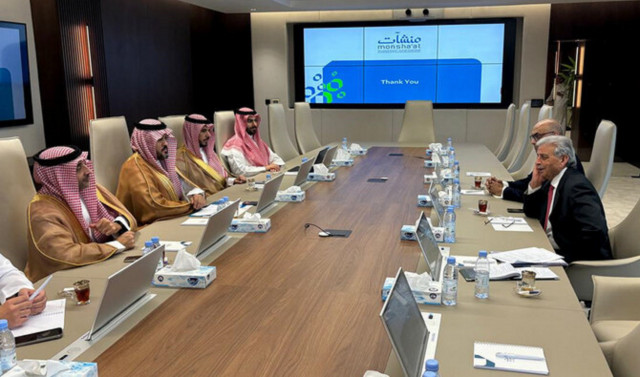Industrial policy unveiled at UNIDO
It focuses on green energy, women empowerment, regional linkages

Minister for Industries and Production Rana Tanveer Hussain on Thursday presented the National Industrial Policy at the United Nations Industrial Development Organisation (Unido) to create an environment that could enable the local industry accelerate its growth and attract foreign investment.
Speaking at the Unido Multilateral Industrial Policy Forum in Riyadh, the industries minister revealed that Pakistan would finalise the policy in the current month, according to a statement issued by the Ministry of Industries.
The policy focuses on green energy initiatives, women empowerment, and regional cooperation, aligning with Pakistan's Vision 2025 and Sustainable Development Goals (SDGs).
The strategies include prioritising high-impact sectors, regional collaboration, inclusive stakeholder engagement, incentivising sustainable practices, and strengthening governance and policy coherence.
The policy will focus on various sectors such as steel, cement, mining, petrochemicals and chemicals, fertiliser, heavy mechanical, non-ferrous metals, plastics and composites, fisheries, transport and logistics.
It also covers value-added sectors such as auto parts, tractors, parts and accessories of office machines, travel accessories, furniture, footwear, synthetic and non-traditional textiles and garments, food processing, surgical and medical devices, electronics, and pharmaceuticals.
Rana Tanveer said that the adoption of green energy initiative was also a prominent aspect of the policy. The minister highlighted that currently the transport sector accounted for over 75% of total commercial oil consumption. Pakistan is using more than 65% of its foreign exchange reserves on fuel imports.
To mitigate this situation, de-carbonisation in the transport sector and the adoption of electric vehicles (EVs) such as electric two and three-wheelers, decentralised power storage, batteries, solar cells, charging stations, etc are being promoted.
Currently, 48 companies have been issued manufacturing licences by the Ministry of Industries and Production, enabling them to produce electric two and three-wheelers in Pakistan.
The solar energy sector is growing fast due to market demand and there are about nine solar panel assemblers in the country. Pakistan is committed to renewable energy, with solar PV projected to reach 30% of energy mix by 2030.
This transition to clean energy will help reduce greenhouse gas (GHG) emissions and air pollutants, lessen dependency on imported fossil fuels, and could also create jobs in the automotive industry in the medium term.
The industrial policy will encompass financial incentives such as tax breaks, subsidies, or grants to encourage industries to adopt sustainable practices, contributing to goals like reducing carbon emissions and improving resource efficiency.
It also envisages measures for women empowerment, which include ensuring implementation of the "Banking on Equality" policy.




1733130350-0/Untitled-design-(76)1733130350-0-208x130.webp)













COMMENTS
Comments are moderated and generally will be posted if they are on-topic and not abusive.
For more information, please see our Comments FAQ